Glasgow Caledonian University: Hilton Hotels Employee Training Impact
VerifiedAdded on 2022/11/18
|46
|13121
|275
Project
AI Summary
This MBA dissertation, submitted to Glasgow Caledonian University by Rajat Sharma, investigates the impact of training and development on employee job performance at Hilton Hotels UK. The research explores the background and rationale, identifying the significance of training in the hospitality sector and the specific challenges faced by Hilton Hotels UK in terms of employee training. The study aims to analyze the impact of existing training approaches, evaluate their effectiveness, identify areas for improvement, and recommend strategies to enhance employee job performance. The literature review covers concepts of employee job performance, training approaches in the hotel industry, and specific training methods employed by Hilton Hotels UK. The methodology includes details on research philosophy, approach, strategy, data collection methods, sampling, and data analysis. The findings and analysis chapter presents the results of the research, discussing the impact of training on employee performance, and limitations. The conclusion summarizes the key findings, provides recommendations for Hilton Hotels UK, and suggests areas for future research. The research uses questionnaires and statistical analysis to examine the correlation between training and employee performance. The dissertation concludes with recommendations for improving training programs and enhancing employee job performance within Hilton Hotels UK.
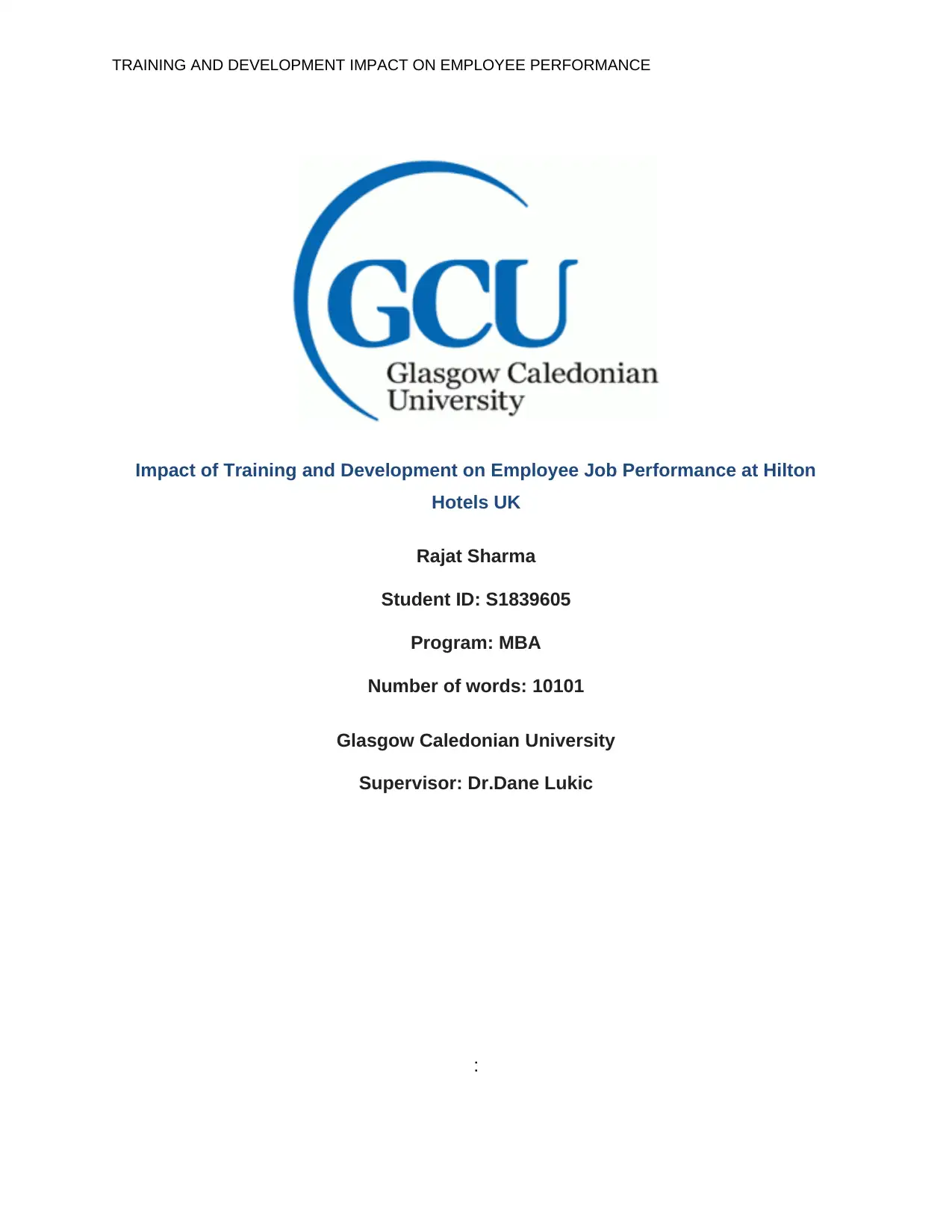
TRAINING AND DEVELOPMENT IMPACT ON EMPLOYEE PERFORMANCE
Impact of Training and Development on Employee Job Performance at Hilton
Hotels UK
Rajat Sharma
Student ID: S1839605
Program: MBA
Number of words: 10101
Glasgow Caledonian University
Supervisor: Dr.Dane Lukic
:
Impact of Training and Development on Employee Job Performance at Hilton
Hotels UK
Rajat Sharma
Student ID: S1839605
Program: MBA
Number of words: 10101
Glasgow Caledonian University
Supervisor: Dr.Dane Lukic
:
Paraphrase This Document
Need a fresh take? Get an instant paraphrase of this document with our AI Paraphraser
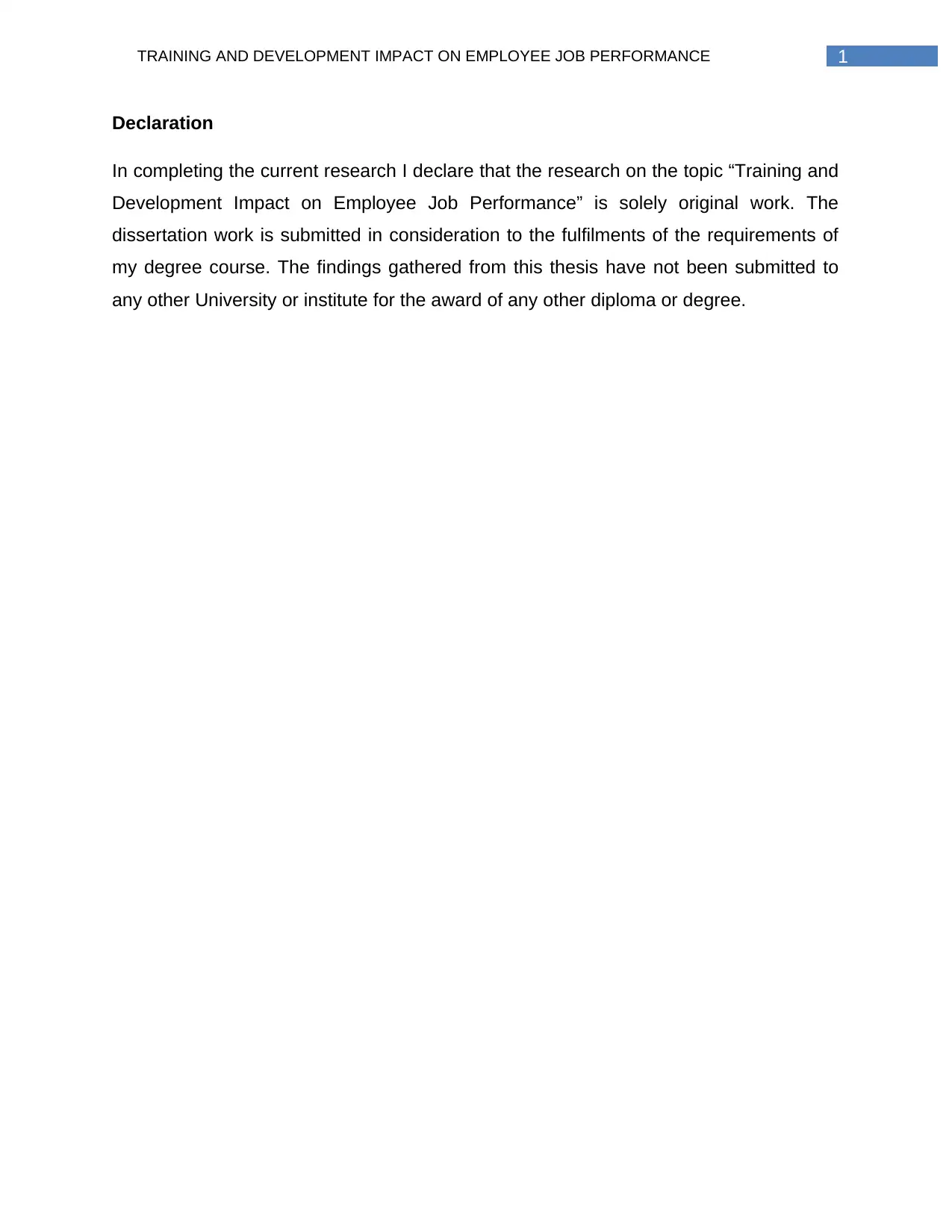
TRAINING AND DEVELOPMENT IMPACT ON EMPLOYEE JOB PERFORMANCE 1
Declaration
In completing the current research I declare that the research on the topic “Training and
Development Impact on Employee Job Performance” is solely original work. The
dissertation work is submitted in consideration to the fulfilments of the requirements of
my degree course. The findings gathered from this thesis have not been submitted to
any other University or institute for the award of any other diploma or degree.
Declaration
In completing the current research I declare that the research on the topic “Training and
Development Impact on Employee Job Performance” is solely original work. The
dissertation work is submitted in consideration to the fulfilments of the requirements of
my degree course. The findings gathered from this thesis have not been submitted to
any other University or institute for the award of any other diploma or degree.
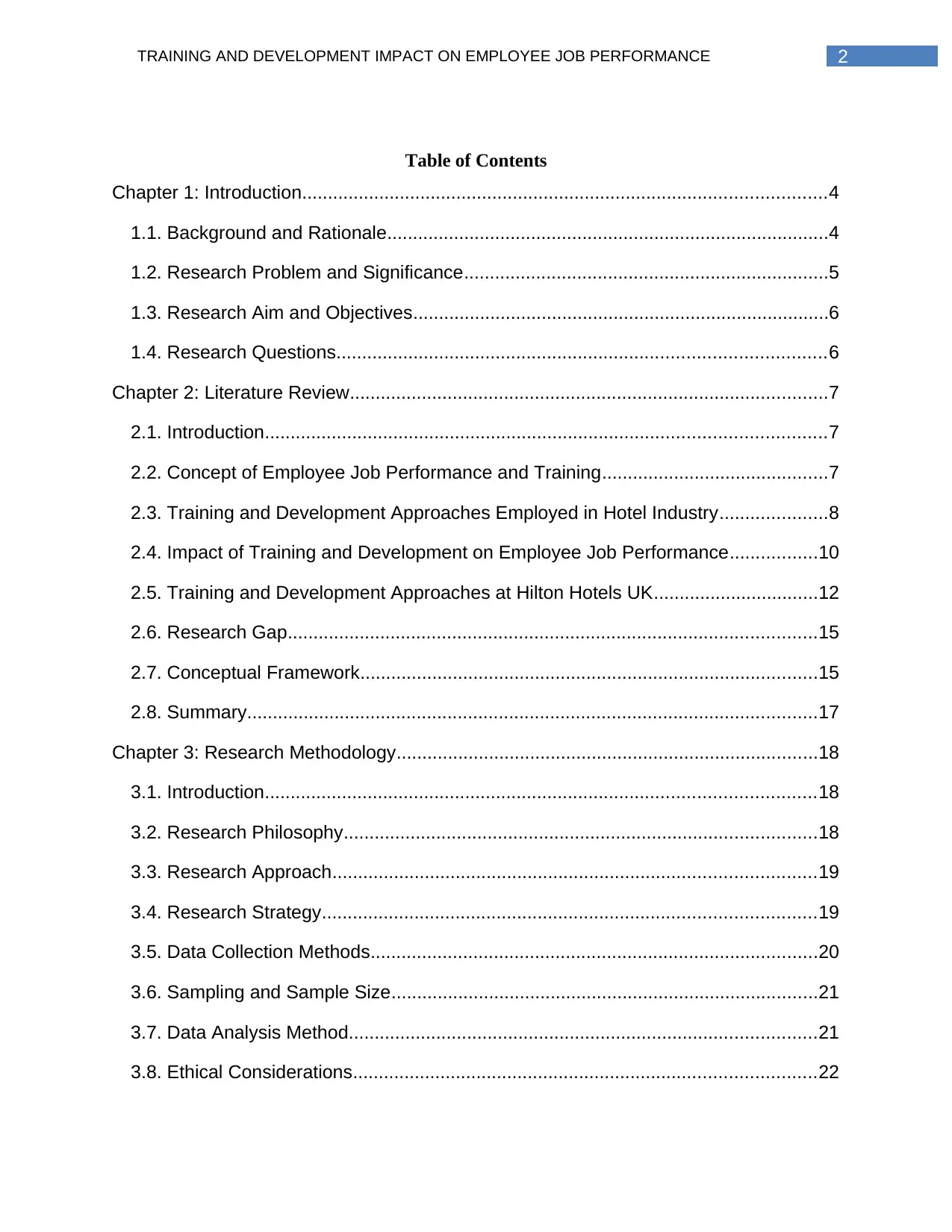
TRAINING AND DEVELOPMENT IMPACT ON EMPLOYEE JOB PERFORMANCE 2
Table of Contents
Chapter 1: Introduction......................................................................................................4
1.1. Background and Rationale......................................................................................4
1.2. Research Problem and Significance.......................................................................5
1.3. Research Aim and Objectives.................................................................................6
1.4. Research Questions...............................................................................................6
Chapter 2: Literature Review.............................................................................................7
2.1. Introduction.............................................................................................................7
2.2. Concept of Employee Job Performance and Training............................................7
2.3. Training and Development Approaches Employed in Hotel Industry.....................8
2.4. Impact of Training and Development on Employee Job Performance.................10
2.5. Training and Development Approaches at Hilton Hotels UK................................12
2.6. Research Gap.......................................................................................................15
2.7. Conceptual Framework.........................................................................................15
2.8. Summary...............................................................................................................17
Chapter 3: Research Methodology..................................................................................18
3.1. Introduction...........................................................................................................18
3.2. Research Philosophy............................................................................................18
3.3. Research Approach..............................................................................................19
3.4. Research Strategy................................................................................................19
3.5. Data Collection Methods.......................................................................................20
3.6. Sampling and Sample Size...................................................................................21
3.7. Data Analysis Method...........................................................................................21
3.8. Ethical Considerations..........................................................................................22
Table of Contents
Chapter 1: Introduction......................................................................................................4
1.1. Background and Rationale......................................................................................4
1.2. Research Problem and Significance.......................................................................5
1.3. Research Aim and Objectives.................................................................................6
1.4. Research Questions...............................................................................................6
Chapter 2: Literature Review.............................................................................................7
2.1. Introduction.............................................................................................................7
2.2. Concept of Employee Job Performance and Training............................................7
2.3. Training and Development Approaches Employed in Hotel Industry.....................8
2.4. Impact of Training and Development on Employee Job Performance.................10
2.5. Training and Development Approaches at Hilton Hotels UK................................12
2.6. Research Gap.......................................................................................................15
2.7. Conceptual Framework.........................................................................................15
2.8. Summary...............................................................................................................17
Chapter 3: Research Methodology..................................................................................18
3.1. Introduction...........................................................................................................18
3.2. Research Philosophy............................................................................................18
3.3. Research Approach..............................................................................................19
3.4. Research Strategy................................................................................................19
3.5. Data Collection Methods.......................................................................................20
3.6. Sampling and Sample Size...................................................................................21
3.7. Data Analysis Method...........................................................................................21
3.8. Ethical Considerations..........................................................................................22
⊘ This is a preview!⊘
Do you want full access?
Subscribe today to unlock all pages.

Trusted by 1+ million students worldwide
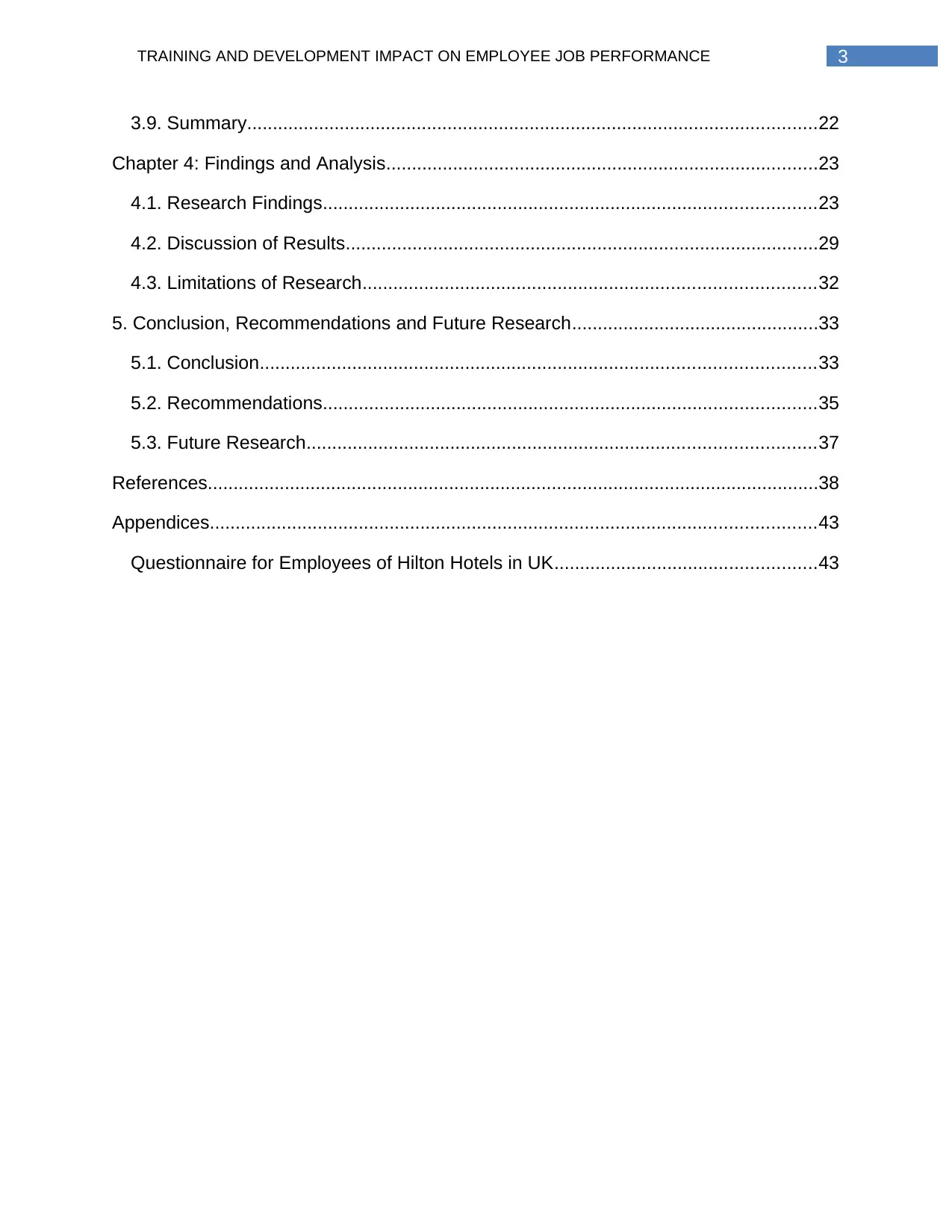
TRAINING AND DEVELOPMENT IMPACT ON EMPLOYEE JOB PERFORMANCE 3
3.9. Summary...............................................................................................................22
Chapter 4: Findings and Analysis....................................................................................23
4.1. Research Findings................................................................................................23
4.2. Discussion of Results............................................................................................29
4.3. Limitations of Research........................................................................................32
5. Conclusion, Recommendations and Future Research................................................33
5.1. Conclusion............................................................................................................33
5.2. Recommendations................................................................................................35
5.3. Future Research...................................................................................................37
References.......................................................................................................................38
Appendices......................................................................................................................43
Questionnaire for Employees of Hilton Hotels in UK...................................................43
3.9. Summary...............................................................................................................22
Chapter 4: Findings and Analysis....................................................................................23
4.1. Research Findings................................................................................................23
4.2. Discussion of Results............................................................................................29
4.3. Limitations of Research........................................................................................32
5. Conclusion, Recommendations and Future Research................................................33
5.1. Conclusion............................................................................................................33
5.2. Recommendations................................................................................................35
5.3. Future Research...................................................................................................37
References.......................................................................................................................38
Appendices......................................................................................................................43
Questionnaire for Employees of Hilton Hotels in UK...................................................43
Paraphrase This Document
Need a fresh take? Get an instant paraphrase of this document with our AI Paraphraser
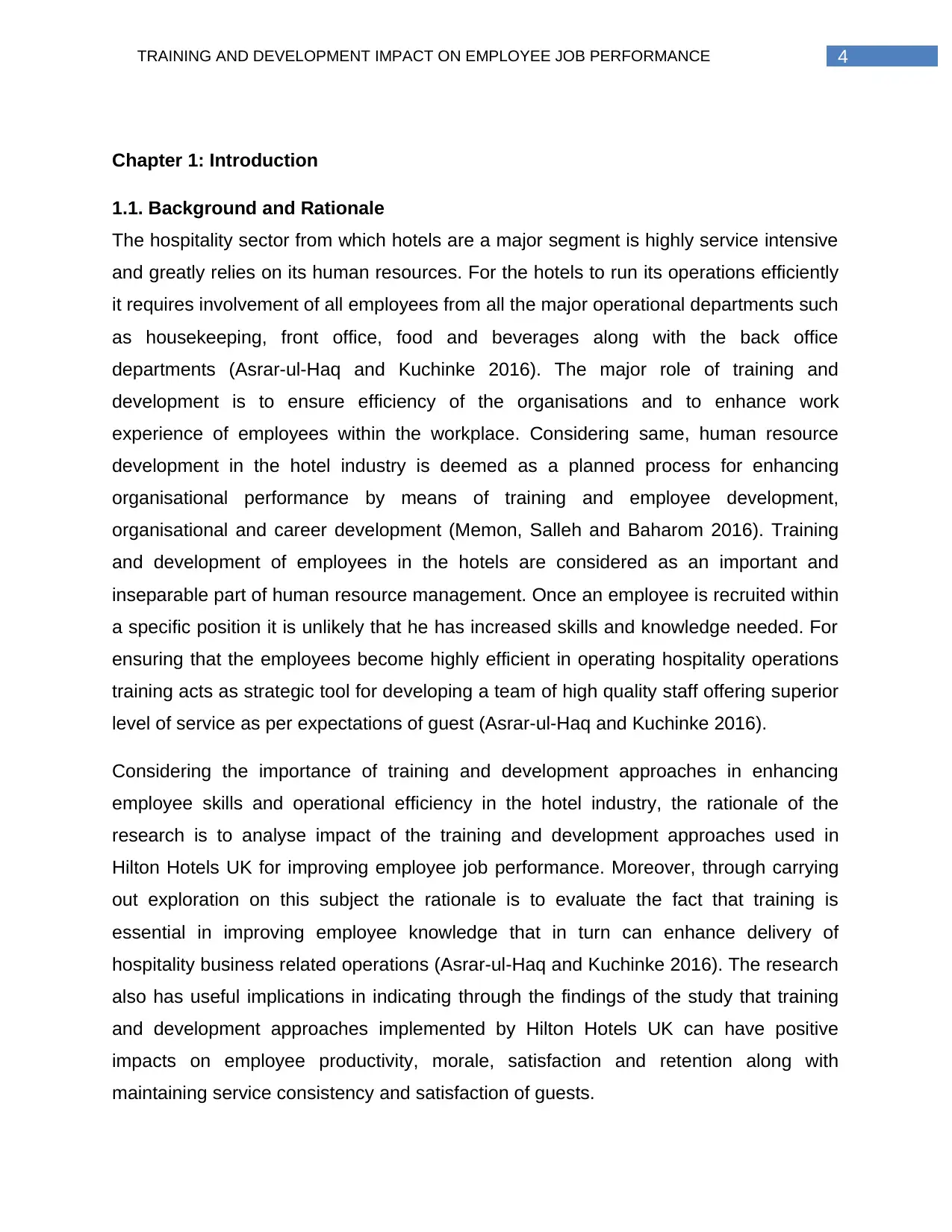
TRAINING AND DEVELOPMENT IMPACT ON EMPLOYEE JOB PERFORMANCE 4
Chapter 1: Introduction
1.1. Background and Rationale
The hospitality sector from which hotels are a major segment is highly service intensive
and greatly relies on its human resources. For the hotels to run its operations efficiently
it requires involvement of all employees from all the major operational departments such
as housekeeping, front office, food and beverages along with the back office
departments (Asrar-ul-Haq and Kuchinke 2016). The major role of training and
development is to ensure efficiency of the organisations and to enhance work
experience of employees within the workplace. Considering same, human resource
development in the hotel industry is deemed as a planned process for enhancing
organisational performance by means of training and employee development,
organisational and career development (Memon, Salleh and Baharom 2016). Training
and development of employees in the hotels are considered as an important and
inseparable part of human resource management. Once an employee is recruited within
a specific position it is unlikely that he has increased skills and knowledge needed. For
ensuring that the employees become highly efficient in operating hospitality operations
training acts as strategic tool for developing a team of high quality staff offering superior
level of service as per expectations of guest (Asrar-ul-Haq and Kuchinke 2016).
Considering the importance of training and development approaches in enhancing
employee skills and operational efficiency in the hotel industry, the rationale of the
research is to analyse impact of the training and development approaches used in
Hilton Hotels UK for improving employee job performance. Moreover, through carrying
out exploration on this subject the rationale is to evaluate the fact that training is
essential in improving employee knowledge that in turn can enhance delivery of
hospitality business related operations (Asrar-ul-Haq and Kuchinke 2016). The research
also has useful implications in indicating through the findings of the study that training
and development approaches implemented by Hilton Hotels UK can have positive
impacts on employee productivity, morale, satisfaction and retention along with
maintaining service consistency and satisfaction of guests.
Chapter 1: Introduction
1.1. Background and Rationale
The hospitality sector from which hotels are a major segment is highly service intensive
and greatly relies on its human resources. For the hotels to run its operations efficiently
it requires involvement of all employees from all the major operational departments such
as housekeeping, front office, food and beverages along with the back office
departments (Asrar-ul-Haq and Kuchinke 2016). The major role of training and
development is to ensure efficiency of the organisations and to enhance work
experience of employees within the workplace. Considering same, human resource
development in the hotel industry is deemed as a planned process for enhancing
organisational performance by means of training and employee development,
organisational and career development (Memon, Salleh and Baharom 2016). Training
and development of employees in the hotels are considered as an important and
inseparable part of human resource management. Once an employee is recruited within
a specific position it is unlikely that he has increased skills and knowledge needed. For
ensuring that the employees become highly efficient in operating hospitality operations
training acts as strategic tool for developing a team of high quality staff offering superior
level of service as per expectations of guest (Asrar-ul-Haq and Kuchinke 2016).
Considering the importance of training and development approaches in enhancing
employee skills and operational efficiency in the hotel industry, the rationale of the
research is to analyse impact of the training and development approaches used in
Hilton Hotels UK for improving employee job performance. Moreover, through carrying
out exploration on this subject the rationale is to evaluate the fact that training is
essential in improving employee knowledge that in turn can enhance delivery of
hospitality business related operations (Asrar-ul-Haq and Kuchinke 2016). The research
also has useful implications in indicating through the findings of the study that training
and development approaches implemented by Hilton Hotels UK can have positive
impacts on employee productivity, morale, satisfaction and retention along with
maintaining service consistency and satisfaction of guests.
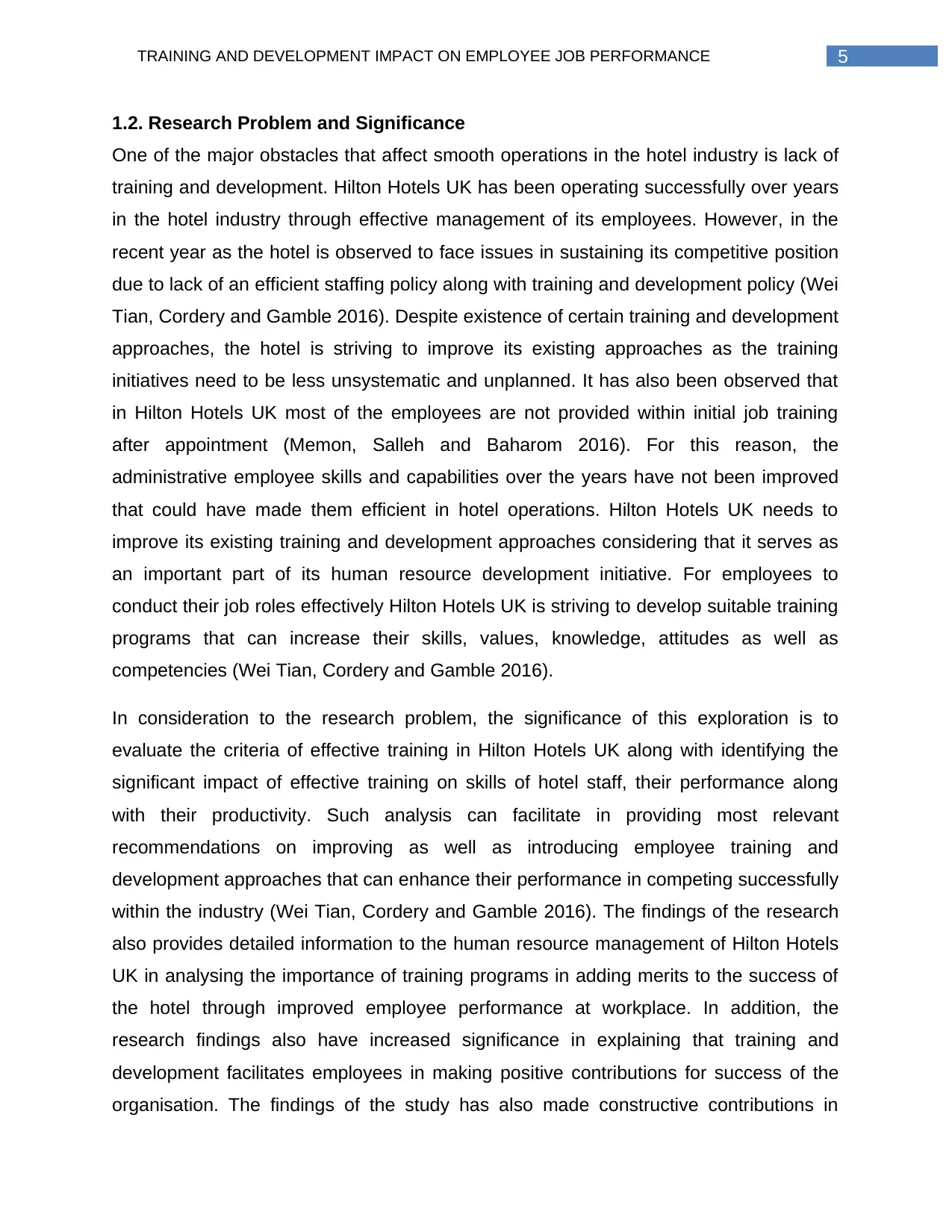
TRAINING AND DEVELOPMENT IMPACT ON EMPLOYEE JOB PERFORMANCE 5
1.2. Research Problem and Significance
One of the major obstacles that affect smooth operations in the hotel industry is lack of
training and development. Hilton Hotels UK has been operating successfully over years
in the hotel industry through effective management of its employees. However, in the
recent year as the hotel is observed to face issues in sustaining its competitive position
due to lack of an efficient staffing policy along with training and development policy (Wei
Tian, Cordery and Gamble 2016). Despite existence of certain training and development
approaches, the hotel is striving to improve its existing approaches as the training
initiatives need to be less unsystematic and unplanned. It has also been observed that
in Hilton Hotels UK most of the employees are not provided within initial job training
after appointment (Memon, Salleh and Baharom 2016). For this reason, the
administrative employee skills and capabilities over the years have not been improved
that could have made them efficient in hotel operations. Hilton Hotels UK needs to
improve its existing training and development approaches considering that it serves as
an important part of its human resource development initiative. For employees to
conduct their job roles effectively Hilton Hotels UK is striving to develop suitable training
programs that can increase their skills, values, knowledge, attitudes as well as
competencies (Wei Tian, Cordery and Gamble 2016).
In consideration to the research problem, the significance of this exploration is to
evaluate the criteria of effective training in Hilton Hotels UK along with identifying the
significant impact of effective training on skills of hotel staff, their performance along
with their productivity. Such analysis can facilitate in providing most relevant
recommendations on improving as well as introducing employee training and
development approaches that can enhance their performance in competing successfully
within the industry (Wei Tian, Cordery and Gamble 2016). The findings of the research
also provides detailed information to the human resource management of Hilton Hotels
UK in analysing the importance of training programs in adding merits to the success of
the hotel through improved employee performance at workplace. In addition, the
research findings also have increased significance in explaining that training and
development facilitates employees in making positive contributions for success of the
organisation. The findings of the study has also made constructive contributions in
1.2. Research Problem and Significance
One of the major obstacles that affect smooth operations in the hotel industry is lack of
training and development. Hilton Hotels UK has been operating successfully over years
in the hotel industry through effective management of its employees. However, in the
recent year as the hotel is observed to face issues in sustaining its competitive position
due to lack of an efficient staffing policy along with training and development policy (Wei
Tian, Cordery and Gamble 2016). Despite existence of certain training and development
approaches, the hotel is striving to improve its existing approaches as the training
initiatives need to be less unsystematic and unplanned. It has also been observed that
in Hilton Hotels UK most of the employees are not provided within initial job training
after appointment (Memon, Salleh and Baharom 2016). For this reason, the
administrative employee skills and capabilities over the years have not been improved
that could have made them efficient in hotel operations. Hilton Hotels UK needs to
improve its existing training and development approaches considering that it serves as
an important part of its human resource development initiative. For employees to
conduct their job roles effectively Hilton Hotels UK is striving to develop suitable training
programs that can increase their skills, values, knowledge, attitudes as well as
competencies (Wei Tian, Cordery and Gamble 2016).
In consideration to the research problem, the significance of this exploration is to
evaluate the criteria of effective training in Hilton Hotels UK along with identifying the
significant impact of effective training on skills of hotel staff, their performance along
with their productivity. Such analysis can facilitate in providing most relevant
recommendations on improving as well as introducing employee training and
development approaches that can enhance their performance in competing successfully
within the industry (Wei Tian, Cordery and Gamble 2016). The findings of the research
also provides detailed information to the human resource management of Hilton Hotels
UK in analysing the importance of training programs in adding merits to the success of
the hotel through improved employee performance at workplace. In addition, the
research findings also have increased significance in explaining that training and
development facilitates employees in making positive contributions for success of the
organisation. The findings of the study has also made constructive contributions in
⊘ This is a preview!⊘
Do you want full access?
Subscribe today to unlock all pages.

Trusted by 1+ million students worldwide
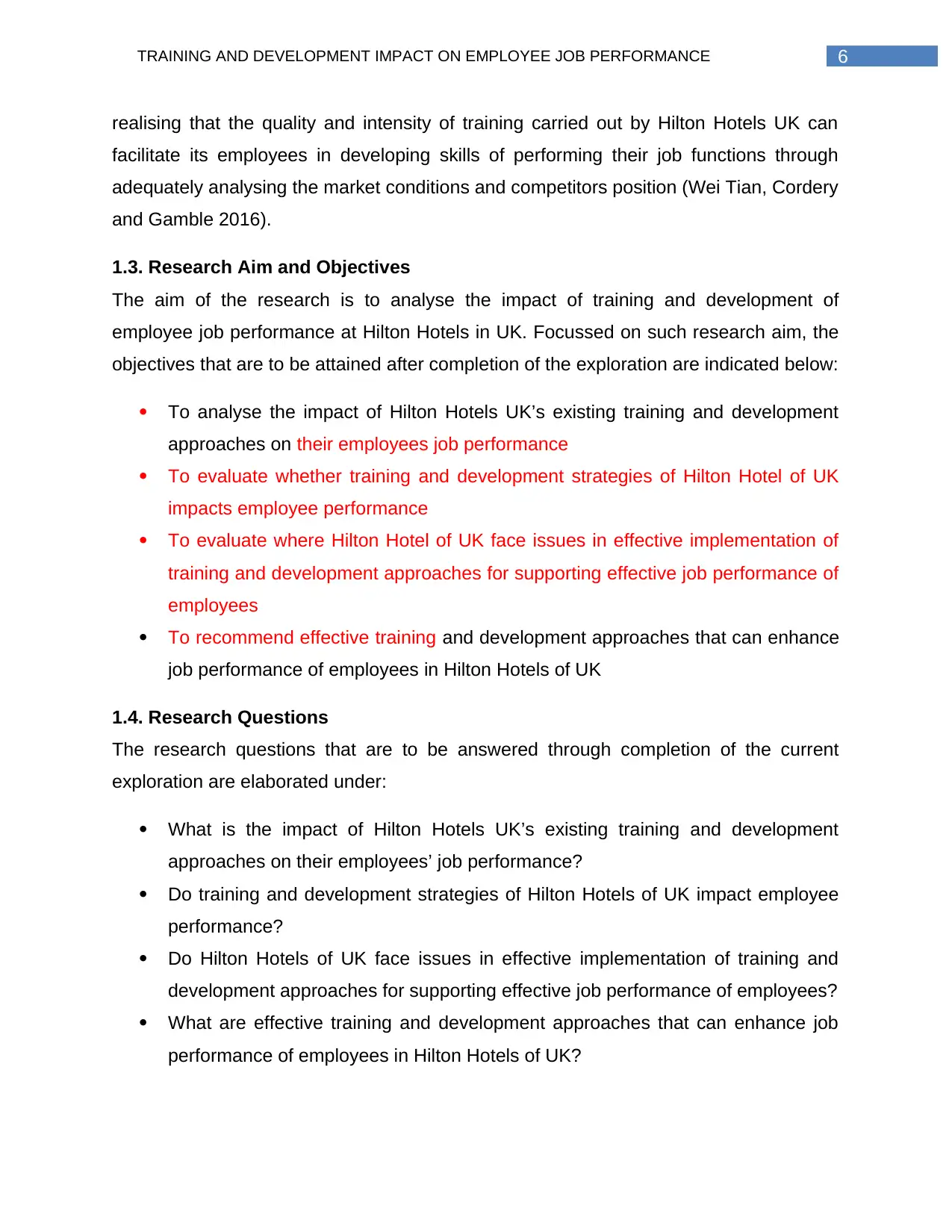
TRAINING AND DEVELOPMENT IMPACT ON EMPLOYEE JOB PERFORMANCE 6
realising that the quality and intensity of training carried out by Hilton Hotels UK can
facilitate its employees in developing skills of performing their job functions through
adequately analysing the market conditions and competitors position (Wei Tian, Cordery
and Gamble 2016).
1.3. Research Aim and Objectives
The aim of the research is to analyse the impact of training and development of
employee job performance at Hilton Hotels in UK. Focussed on such research aim, the
objectives that are to be attained after completion of the exploration are indicated below:
To analyse the impact of Hilton Hotels UK’s existing training and development
approaches on their employees job performance
To evaluate whether training and development strategies of Hilton Hotel of UK
impacts employee performance
To evaluate where Hilton Hotel of UK face issues in effective implementation of
training and development approaches for supporting effective job performance of
employees
To recommend effective training and development approaches that can enhance
job performance of employees in Hilton Hotels of UK
1.4. Research Questions
The research questions that are to be answered through completion of the current
exploration are elaborated under:
What is the impact of Hilton Hotels UK’s existing training and development
approaches on their employees’ job performance?
Do training and development strategies of Hilton Hotels of UK impact employee
performance?
Do Hilton Hotels of UK face issues in effective implementation of training and
development approaches for supporting effective job performance of employees?
What are effective training and development approaches that can enhance job
performance of employees in Hilton Hotels of UK?
realising that the quality and intensity of training carried out by Hilton Hotels UK can
facilitate its employees in developing skills of performing their job functions through
adequately analysing the market conditions and competitors position (Wei Tian, Cordery
and Gamble 2016).
1.3. Research Aim and Objectives
The aim of the research is to analyse the impact of training and development of
employee job performance at Hilton Hotels in UK. Focussed on such research aim, the
objectives that are to be attained after completion of the exploration are indicated below:
To analyse the impact of Hilton Hotels UK’s existing training and development
approaches on their employees job performance
To evaluate whether training and development strategies of Hilton Hotel of UK
impacts employee performance
To evaluate where Hilton Hotel of UK face issues in effective implementation of
training and development approaches for supporting effective job performance of
employees
To recommend effective training and development approaches that can enhance
job performance of employees in Hilton Hotels of UK
1.4. Research Questions
The research questions that are to be answered through completion of the current
exploration are elaborated under:
What is the impact of Hilton Hotels UK’s existing training and development
approaches on their employees’ job performance?
Do training and development strategies of Hilton Hotels of UK impact employee
performance?
Do Hilton Hotels of UK face issues in effective implementation of training and
development approaches for supporting effective job performance of employees?
What are effective training and development approaches that can enhance job
performance of employees in Hilton Hotels of UK?
Paraphrase This Document
Need a fresh take? Get an instant paraphrase of this document with our AI Paraphraser
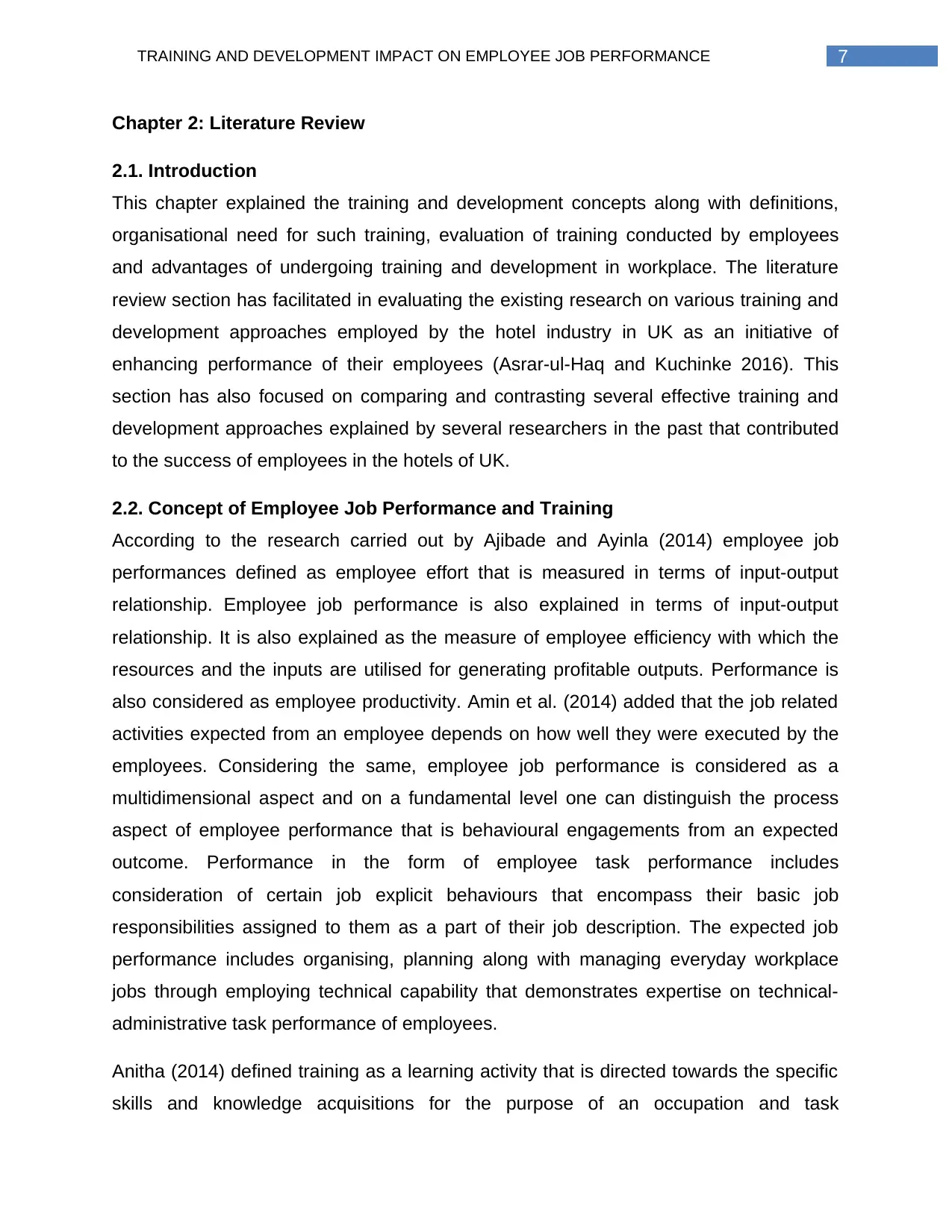
TRAINING AND DEVELOPMENT IMPACT ON EMPLOYEE JOB PERFORMANCE 7
Chapter 2: Literature Review
2.1. Introduction
This chapter explained the training and development concepts along with definitions,
organisational need for such training, evaluation of training conducted by employees
and advantages of undergoing training and development in workplace. The literature
review section has facilitated in evaluating the existing research on various training and
development approaches employed by the hotel industry in UK as an initiative of
enhancing performance of their employees (Asrar-ul-Haq and Kuchinke 2016). This
section has also focused on comparing and contrasting several effective training and
development approaches explained by several researchers in the past that contributed
to the success of employees in the hotels of UK.
2.2. Concept of Employee Job Performance and Training
According to the research carried out by Ajibade and Ayinla (2014) employee job
performances defined as employee effort that is measured in terms of input-output
relationship. Employee job performance is also explained in terms of input-output
relationship. It is also explained as the measure of employee efficiency with which the
resources and the inputs are utilised for generating profitable outputs. Performance is
also considered as employee productivity. Amin et al. (2014) added that the job related
activities expected from an employee depends on how well they were executed by the
employees. Considering the same, employee job performance is considered as a
multidimensional aspect and on a fundamental level one can distinguish the process
aspect of employee performance that is behavioural engagements from an expected
outcome. Performance in the form of employee task performance includes
consideration of certain job explicit behaviours that encompass their basic job
responsibilities assigned to them as a part of their job description. The expected job
performance includes organising, planning along with managing everyday workplace
jobs through employing technical capability that demonstrates expertise on technical-
administrative task performance of employees.
Anitha (2014) defined training as a learning activity that is directed towards the specific
skills and knowledge acquisitions for the purpose of an occupation and task
Chapter 2: Literature Review
2.1. Introduction
This chapter explained the training and development concepts along with definitions,
organisational need for such training, evaluation of training conducted by employees
and advantages of undergoing training and development in workplace. The literature
review section has facilitated in evaluating the existing research on various training and
development approaches employed by the hotel industry in UK as an initiative of
enhancing performance of their employees (Asrar-ul-Haq and Kuchinke 2016). This
section has also focused on comparing and contrasting several effective training and
development approaches explained by several researchers in the past that contributed
to the success of employees in the hotels of UK.
2.2. Concept of Employee Job Performance and Training
According to the research carried out by Ajibade and Ayinla (2014) employee job
performances defined as employee effort that is measured in terms of input-output
relationship. Employee job performance is also explained in terms of input-output
relationship. It is also explained as the measure of employee efficiency with which the
resources and the inputs are utilised for generating profitable outputs. Performance is
also considered as employee productivity. Amin et al. (2014) added that the job related
activities expected from an employee depends on how well they were executed by the
employees. Considering the same, employee job performance is considered as a
multidimensional aspect and on a fundamental level one can distinguish the process
aspect of employee performance that is behavioural engagements from an expected
outcome. Performance in the form of employee task performance includes
consideration of certain job explicit behaviours that encompass their basic job
responsibilities assigned to them as a part of their job description. The expected job
performance includes organising, planning along with managing everyday workplace
jobs through employing technical capability that demonstrates expertise on technical-
administrative task performance of employees.
Anitha (2014) defined training as a learning activity that is directed towards the specific
skills and knowledge acquisitions for the purpose of an occupation and task
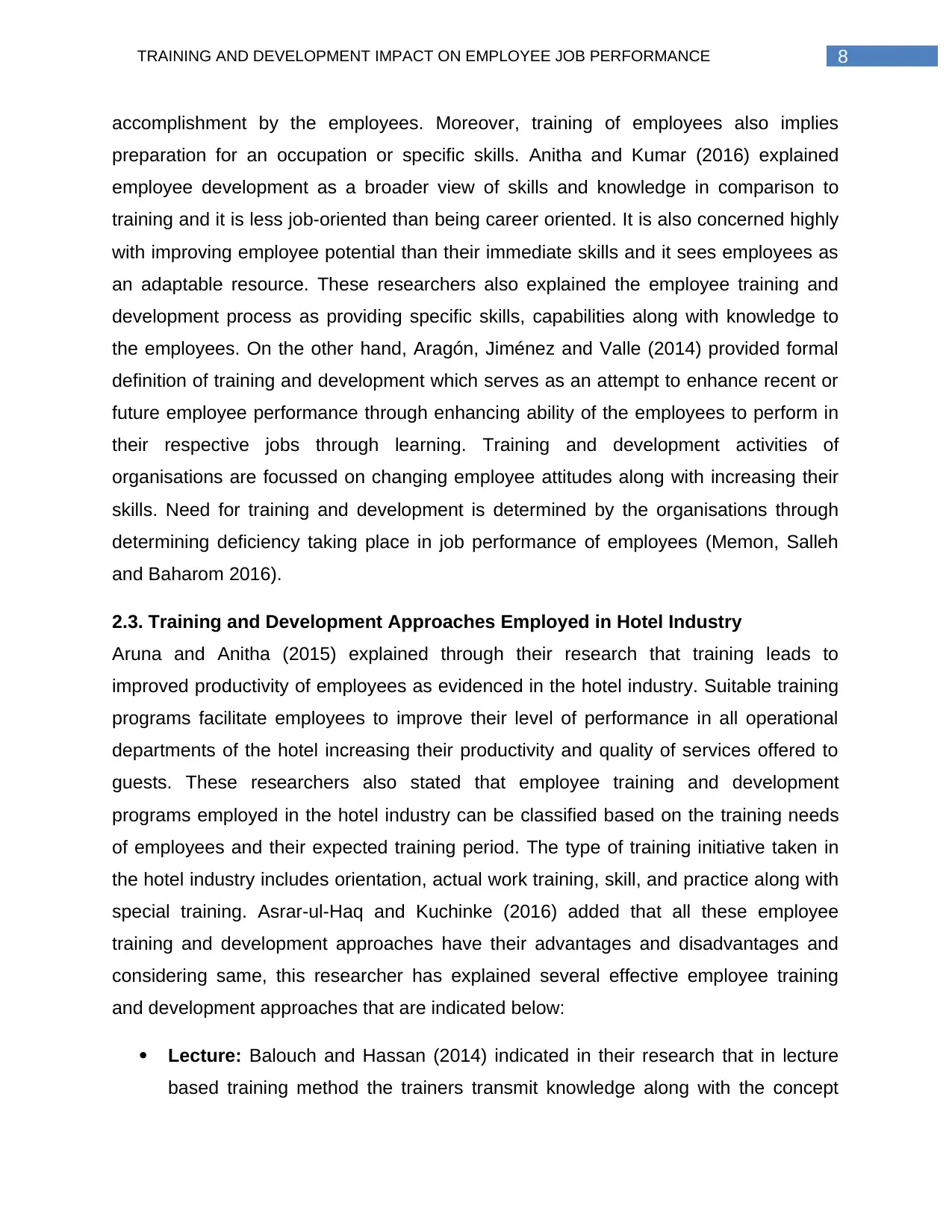
TRAINING AND DEVELOPMENT IMPACT ON EMPLOYEE JOB PERFORMANCE 8
accomplishment by the employees. Moreover, training of employees also implies
preparation for an occupation or specific skills. Anitha and Kumar (2016) explained
employee development as a broader view of skills and knowledge in comparison to
training and it is less job-oriented than being career oriented. It is also concerned highly
with improving employee potential than their immediate skills and it sees employees as
an adaptable resource. These researchers also explained the employee training and
development process as providing specific skills, capabilities along with knowledge to
the employees. On the other hand, Aragón, Jiménez and Valle (2014) provided formal
definition of training and development which serves as an attempt to enhance recent or
future employee performance through enhancing ability of the employees to perform in
their respective jobs through learning. Training and development activities of
organisations are focussed on changing employee attitudes along with increasing their
skills. Need for training and development is determined by the organisations through
determining deficiency taking place in job performance of employees (Memon, Salleh
and Baharom 2016).
2.3. Training and Development Approaches Employed in Hotel Industry
Aruna and Anitha (2015) explained through their research that training leads to
improved productivity of employees as evidenced in the hotel industry. Suitable training
programs facilitate employees to improve their level of performance in all operational
departments of the hotel increasing their productivity and quality of services offered to
guests. These researchers also stated that employee training and development
programs employed in the hotel industry can be classified based on the training needs
of employees and their expected training period. The type of training initiative taken in
the hotel industry includes orientation, actual work training, skill, and practice along with
special training. Asrar-ul-Haq and Kuchinke (2016) added that all these employee
training and development approaches have their advantages and disadvantages and
considering same, this researcher has explained several effective employee training
and development approaches that are indicated below:
Lecture: Balouch and Hassan (2014) indicated in their research that in lecture
based training method the trainers transmit knowledge along with the concept
accomplishment by the employees. Moreover, training of employees also implies
preparation for an occupation or specific skills. Anitha and Kumar (2016) explained
employee development as a broader view of skills and knowledge in comparison to
training and it is less job-oriented than being career oriented. It is also concerned highly
with improving employee potential than their immediate skills and it sees employees as
an adaptable resource. These researchers also explained the employee training and
development process as providing specific skills, capabilities along with knowledge to
the employees. On the other hand, Aragón, Jiménez and Valle (2014) provided formal
definition of training and development which serves as an attempt to enhance recent or
future employee performance through enhancing ability of the employees to perform in
their respective jobs through learning. Training and development activities of
organisations are focussed on changing employee attitudes along with increasing their
skills. Need for training and development is determined by the organisations through
determining deficiency taking place in job performance of employees (Memon, Salleh
and Baharom 2016).
2.3. Training and Development Approaches Employed in Hotel Industry
Aruna and Anitha (2015) explained through their research that training leads to
improved productivity of employees as evidenced in the hotel industry. Suitable training
programs facilitate employees to improve their level of performance in all operational
departments of the hotel increasing their productivity and quality of services offered to
guests. These researchers also stated that employee training and development
programs employed in the hotel industry can be classified based on the training needs
of employees and their expected training period. The type of training initiative taken in
the hotel industry includes orientation, actual work training, skill, and practice along with
special training. Asrar-ul-Haq and Kuchinke (2016) added that all these employee
training and development approaches have their advantages and disadvantages and
considering same, this researcher has explained several effective employee training
and development approaches that are indicated below:
Lecture: Balouch and Hassan (2014) indicated in their research that in lecture
based training method the trainers transmit knowledge along with the concept
⊘ This is a preview!⊘
Do you want full access?
Subscribe today to unlock all pages.

Trusted by 1+ million students worldwide
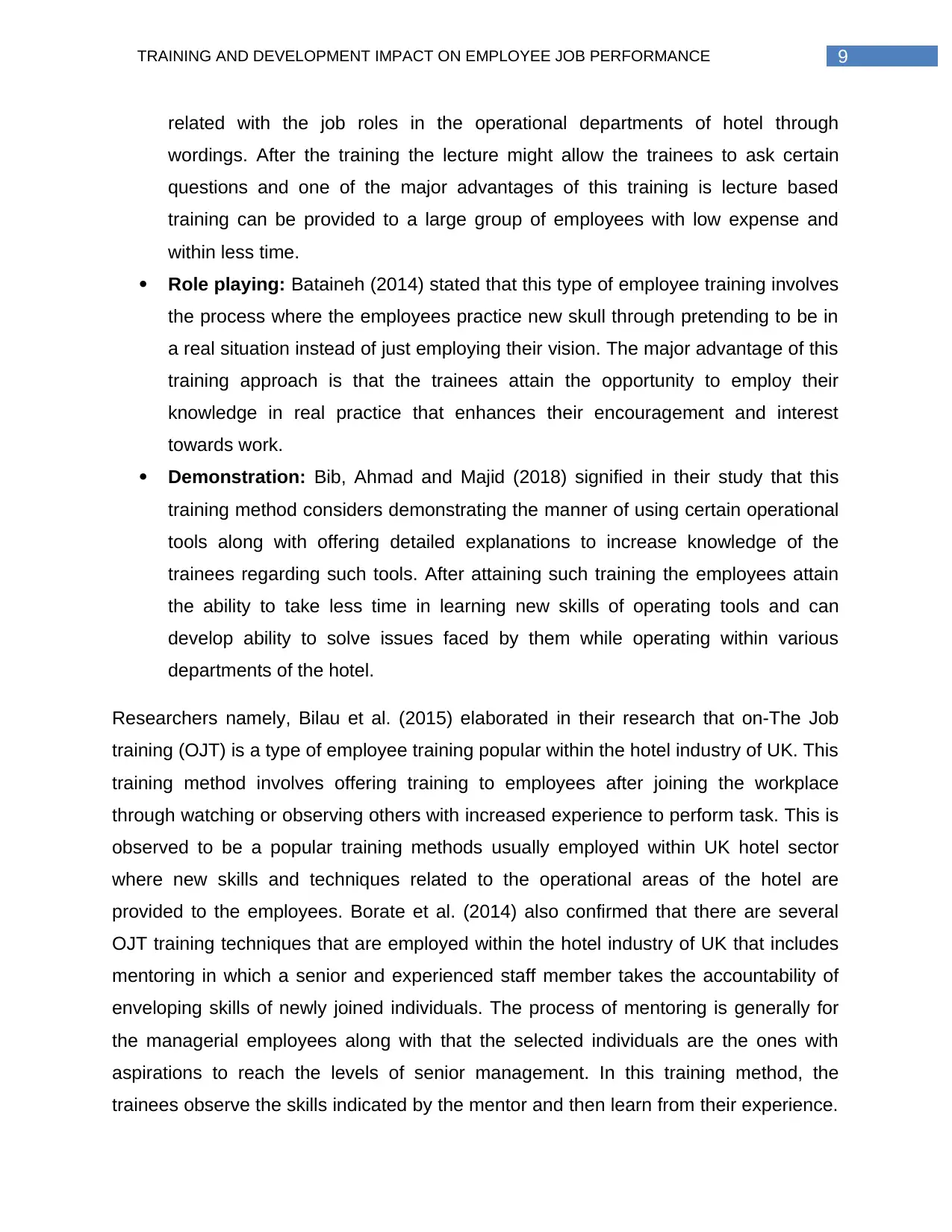
TRAINING AND DEVELOPMENT IMPACT ON EMPLOYEE JOB PERFORMANCE 9
related with the job roles in the operational departments of hotel through
wordings. After the training the lecture might allow the trainees to ask certain
questions and one of the major advantages of this training is lecture based
training can be provided to a large group of employees with low expense and
within less time.
Role playing: Bataineh (2014) stated that this type of employee training involves
the process where the employees practice new skull through pretending to be in
a real situation instead of just employing their vision. The major advantage of this
training approach is that the trainees attain the opportunity to employ their
knowledge in real practice that enhances their encouragement and interest
towards work.
Demonstration: Bib, Ahmad and Majid (2018) signified in their study that this
training method considers demonstrating the manner of using certain operational
tools along with offering detailed explanations to increase knowledge of the
trainees regarding such tools. After attaining such training the employees attain
the ability to take less time in learning new skills of operating tools and can
develop ability to solve issues faced by them while operating within various
departments of the hotel.
Researchers namely, Bilau et al. (2015) elaborated in their research that on-The Job
training (OJT) is a type of employee training popular within the hotel industry of UK. This
training method involves offering training to employees after joining the workplace
through watching or observing others with increased experience to perform task. This is
observed to be a popular training methods usually employed within UK hotel sector
where new skills and techniques related to the operational areas of the hotel are
provided to the employees. Borate et al. (2014) also confirmed that there are several
OJT training techniques that are employed within the hotel industry of UK that includes
mentoring in which a senior and experienced staff member takes the accountability of
enveloping skills of newly joined individuals. The process of mentoring is generally for
the managerial employees along with that the selected individuals are the ones with
aspirations to reach the levels of senior management. In this training method, the
trainees observe the skills indicated by the mentor and then learn from their experience.
related with the job roles in the operational departments of hotel through
wordings. After the training the lecture might allow the trainees to ask certain
questions and one of the major advantages of this training is lecture based
training can be provided to a large group of employees with low expense and
within less time.
Role playing: Bataineh (2014) stated that this type of employee training involves
the process where the employees practice new skull through pretending to be in
a real situation instead of just employing their vision. The major advantage of this
training approach is that the trainees attain the opportunity to employ their
knowledge in real practice that enhances their encouragement and interest
towards work.
Demonstration: Bib, Ahmad and Majid (2018) signified in their study that this
training method considers demonstrating the manner of using certain operational
tools along with offering detailed explanations to increase knowledge of the
trainees regarding such tools. After attaining such training the employees attain
the ability to take less time in learning new skills of operating tools and can
develop ability to solve issues faced by them while operating within various
departments of the hotel.
Researchers namely, Bilau et al. (2015) elaborated in their research that on-The Job
training (OJT) is a type of employee training popular within the hotel industry of UK. This
training method involves offering training to employees after joining the workplace
through watching or observing others with increased experience to perform task. This is
observed to be a popular training methods usually employed within UK hotel sector
where new skills and techniques related to the operational areas of the hotel are
provided to the employees. Borate et al. (2014) also confirmed that there are several
OJT training techniques that are employed within the hotel industry of UK that includes
mentoring in which a senior and experienced staff member takes the accountability of
enveloping skills of newly joined individuals. The process of mentoring is generally for
the managerial employees along with that the selected individuals are the ones with
aspirations to reach the levels of senior management. In this training method, the
trainees observe the skills indicated by the mentor and then learn from their experience.
Paraphrase This Document
Need a fresh take? Get an instant paraphrase of this document with our AI Paraphraser
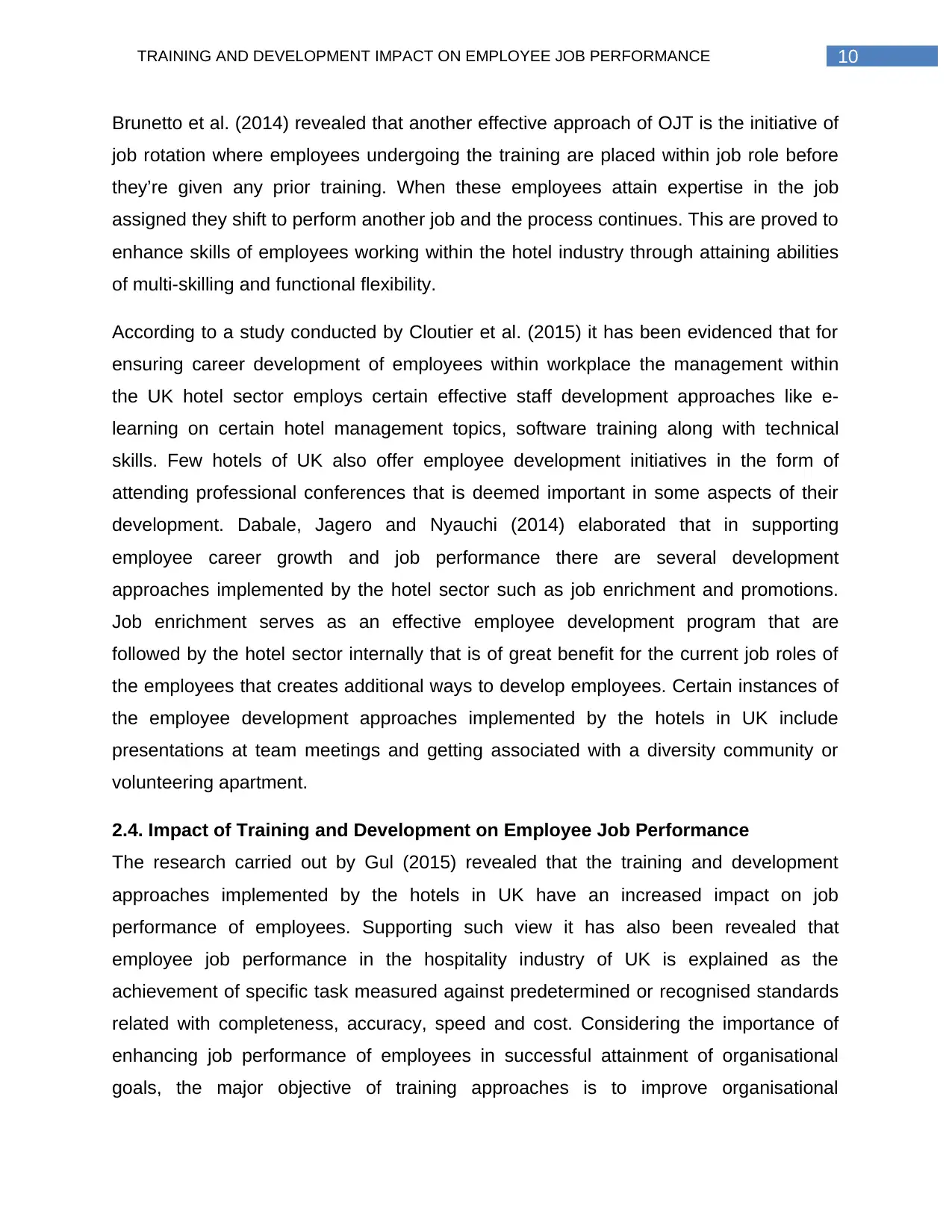
TRAINING AND DEVELOPMENT IMPACT ON EMPLOYEE JOB PERFORMANCE 10
Brunetto et al. (2014) revealed that another effective approach of OJT is the initiative of
job rotation where employees undergoing the training are placed within job role before
they’re given any prior training. When these employees attain expertise in the job
assigned they shift to perform another job and the process continues. This are proved to
enhance skills of employees working within the hotel industry through attaining abilities
of multi-skilling and functional flexibility.
According to a study conducted by Cloutier et al. (2015) it has been evidenced that for
ensuring career development of employees within workplace the management within
the UK hotel sector employs certain effective staff development approaches like e-
learning on certain hotel management topics, software training along with technical
skills. Few hotels of UK also offer employee development initiatives in the form of
attending professional conferences that is deemed important in some aspects of their
development. Dabale, Jagero and Nyauchi (2014) elaborated that in supporting
employee career growth and job performance there are several development
approaches implemented by the hotel sector such as job enrichment and promotions.
Job enrichment serves as an effective employee development program that are
followed by the hotel sector internally that is of great benefit for the current job roles of
the employees that creates additional ways to develop employees. Certain instances of
the employee development approaches implemented by the hotels in UK include
presentations at team meetings and getting associated with a diversity community or
volunteering apartment.
2.4. Impact of Training and Development on Employee Job Performance
The research carried out by Gul (2015) revealed that the training and development
approaches implemented by the hotels in UK have an increased impact on job
performance of employees. Supporting such view it has also been revealed that
employee job performance in the hospitality industry of UK is explained as the
achievement of specific task measured against predetermined or recognised standards
related with completeness, accuracy, speed and cost. Considering the importance of
enhancing job performance of employees in successful attainment of organisational
goals, the major objective of training approaches is to improve organisational
Brunetto et al. (2014) revealed that another effective approach of OJT is the initiative of
job rotation where employees undergoing the training are placed within job role before
they’re given any prior training. When these employees attain expertise in the job
assigned they shift to perform another job and the process continues. This are proved to
enhance skills of employees working within the hotel industry through attaining abilities
of multi-skilling and functional flexibility.
According to a study conducted by Cloutier et al. (2015) it has been evidenced that for
ensuring career development of employees within workplace the management within
the UK hotel sector employs certain effective staff development approaches like e-
learning on certain hotel management topics, software training along with technical
skills. Few hotels of UK also offer employee development initiatives in the form of
attending professional conferences that is deemed important in some aspects of their
development. Dabale, Jagero and Nyauchi (2014) elaborated that in supporting
employee career growth and job performance there are several development
approaches implemented by the hotel sector such as job enrichment and promotions.
Job enrichment serves as an effective employee development program that are
followed by the hotel sector internally that is of great benefit for the current job roles of
the employees that creates additional ways to develop employees. Certain instances of
the employee development approaches implemented by the hotels in UK include
presentations at team meetings and getting associated with a diversity community or
volunteering apartment.
2.4. Impact of Training and Development on Employee Job Performance
The research carried out by Gul (2015) revealed that the training and development
approaches implemented by the hotels in UK have an increased impact on job
performance of employees. Supporting such view it has also been revealed that
employee job performance in the hospitality industry of UK is explained as the
achievement of specific task measured against predetermined or recognised standards
related with completeness, accuracy, speed and cost. Considering the importance of
enhancing job performance of employees in successful attainment of organisational
goals, the major objective of training approaches is to improve organisational
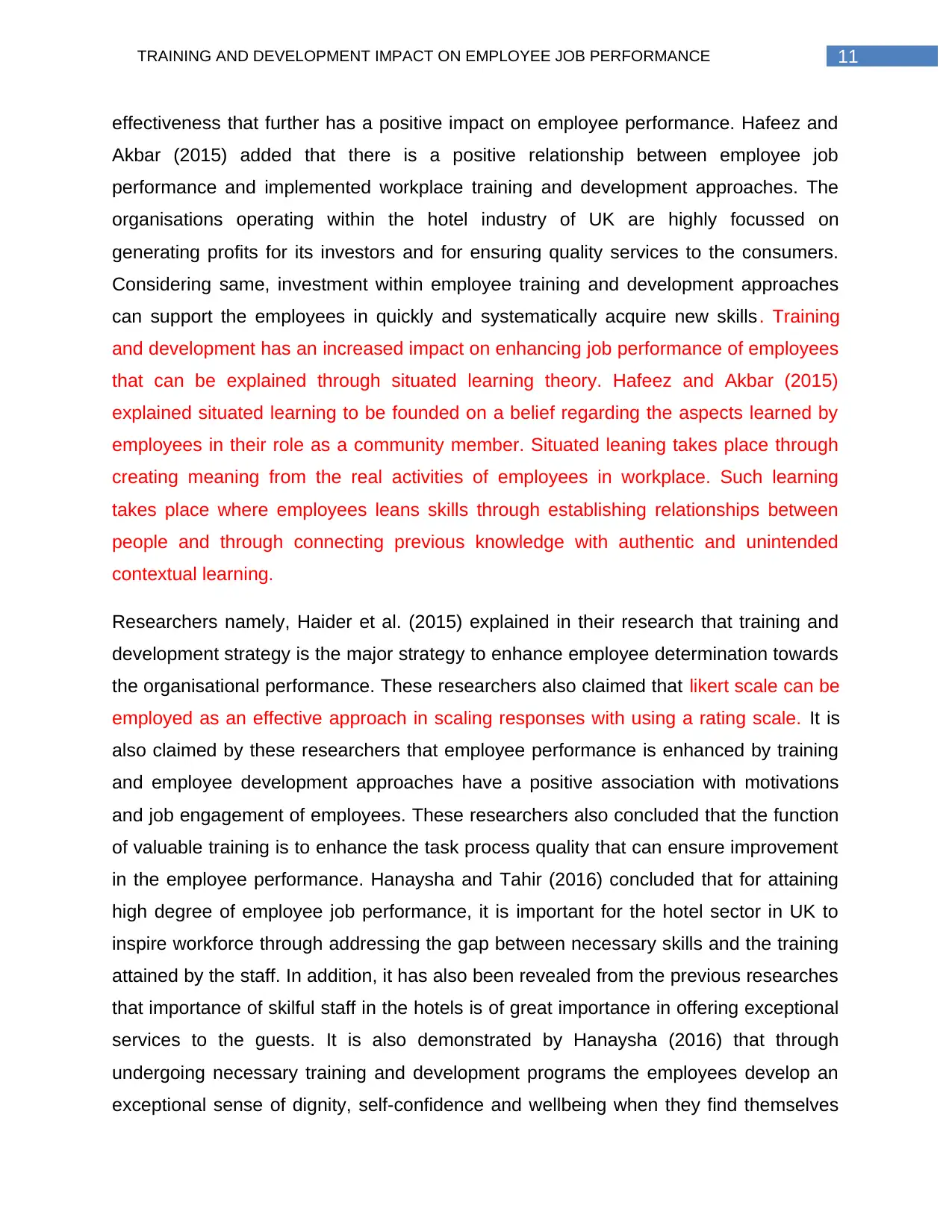
TRAINING AND DEVELOPMENT IMPACT ON EMPLOYEE JOB PERFORMANCE 11
effectiveness that further has a positive impact on employee performance. Hafeez and
Akbar (2015) added that there is a positive relationship between employee job
performance and implemented workplace training and development approaches. The
organisations operating within the hotel industry of UK are highly focussed on
generating profits for its investors and for ensuring quality services to the consumers.
Considering same, investment within employee training and development approaches
can support the employees in quickly and systematically acquire new skills. Training
and development has an increased impact on enhancing job performance of employees
that can be explained through situated learning theory. Hafeez and Akbar (2015)
explained situated learning to be founded on a belief regarding the aspects learned by
employees in their role as a community member. Situated leaning takes place through
creating meaning from the real activities of employees in workplace. Such learning
takes place where employees leans skills through establishing relationships between
people and through connecting previous knowledge with authentic and unintended
contextual learning.
Researchers namely, Haider et al. (2015) explained in their research that training and
development strategy is the major strategy to enhance employee determination towards
the organisational performance. These researchers also claimed that likert scale can be
employed as an effective approach in scaling responses with using a rating scale. It is
also claimed by these researchers that employee performance is enhanced by training
and employee development approaches have a positive association with motivations
and job engagement of employees. These researchers also concluded that the function
of valuable training is to enhance the task process quality that can ensure improvement
in the employee performance. Hanaysha and Tahir (2016) concluded that for attaining
high degree of employee job performance, it is important for the hotel sector in UK to
inspire workforce through addressing the gap between necessary skills and the training
attained by the staff. In addition, it has also been revealed from the previous researches
that importance of skilful staff in the hotels is of great importance in offering exceptional
services to the guests. It is also demonstrated by Hanaysha (2016) that through
undergoing necessary training and development programs the employees develop an
exceptional sense of dignity, self-confidence and wellbeing when they find themselves
effectiveness that further has a positive impact on employee performance. Hafeez and
Akbar (2015) added that there is a positive relationship between employee job
performance and implemented workplace training and development approaches. The
organisations operating within the hotel industry of UK are highly focussed on
generating profits for its investors and for ensuring quality services to the consumers.
Considering same, investment within employee training and development approaches
can support the employees in quickly and systematically acquire new skills. Training
and development has an increased impact on enhancing job performance of employees
that can be explained through situated learning theory. Hafeez and Akbar (2015)
explained situated learning to be founded on a belief regarding the aspects learned by
employees in their role as a community member. Situated leaning takes place through
creating meaning from the real activities of employees in workplace. Such learning
takes place where employees leans skills through establishing relationships between
people and through connecting previous knowledge with authentic and unintended
contextual learning.
Researchers namely, Haider et al. (2015) explained in their research that training and
development strategy is the major strategy to enhance employee determination towards
the organisational performance. These researchers also claimed that likert scale can be
employed as an effective approach in scaling responses with using a rating scale. It is
also claimed by these researchers that employee performance is enhanced by training
and employee development approaches have a positive association with motivations
and job engagement of employees. These researchers also concluded that the function
of valuable training is to enhance the task process quality that can ensure improvement
in the employee performance. Hanaysha and Tahir (2016) concluded that for attaining
high degree of employee job performance, it is important for the hotel sector in UK to
inspire workforce through addressing the gap between necessary skills and the training
attained by the staff. In addition, it has also been revealed from the previous researches
that importance of skilful staff in the hotels is of great importance in offering exceptional
services to the guests. It is also demonstrated by Hanaysha (2016) that through
undergoing necessary training and development programs the employees develop an
exceptional sense of dignity, self-confidence and wellbeing when they find themselves
⊘ This is a preview!⊘
Do you want full access?
Subscribe today to unlock all pages.

Trusted by 1+ million students worldwide
1 out of 46
Related Documents
Your All-in-One AI-Powered Toolkit for Academic Success.
+13062052269
info@desklib.com
Available 24*7 on WhatsApp / Email
![[object Object]](/_next/static/media/star-bottom.7253800d.svg)
Unlock your academic potential
Copyright © 2020–2026 A2Z Services. All Rights Reserved. Developed and managed by ZUCOL.




